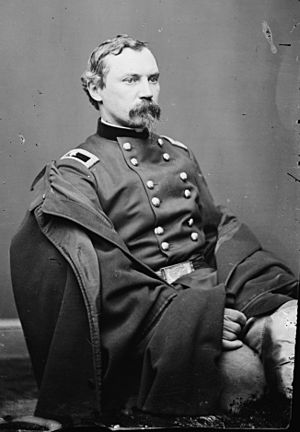Innis N. Palmer facts for kids
Quick facts for kids
Innis Newton Palmer
|
|
|---|---|

Innis N. Palmer
|
|
| Born | March 30, 1824 Buffalo, New York |
| Died | September 10, 1900 (aged 76) Chevy Chase, Maryland |
| Place of burial | |
| Allegiance | United States of America Union |
| Service/ |
United States Army Union Army |
| Years of service | 1846–1879 |
| Rank | |
| Commands held | 2nd U.S. Cavalry |
| Battles/wars | Mexican–American War
|
Innis Newton Palmer (born March 30, 1824 – died September 10, 1900) was an important officer in the United States Army. He served in three big conflicts: the Mexican–American War, the Civil War, and battles on the Western frontier of the United States.
Contents
Early Life and Military Training
Innis Newton Palmer was born in Buffalo, New York. As a boy, he sang in his local church choir. In 1842, he joined the United States Military Academy at West Point. This is a famous school for training army officers.
Graduating from West Point
Palmer finished West Point in 1846. He became a brevet second lieutenant. A brevet rank is a temporary higher rank given for bravery. He joined the 2nd U.S. Mounted Rifles.
Service in the Mexican-American War
Palmer quickly became a first lieutenant. This was during the Mexican–American War. He showed great courage in several battles.
Key Battles and Promotions
- He was praised for his bravery at the Battles of Contreras and Churubusco.
- His courage at the Battle of Chapultepec earned him a brevet promotion. He was made a brevet captain.
- In March 1855, he became a full captain. He joined the 2nd U.S. Cavalry.
The American Civil War
When the American Civil War started in April 1861, Palmer was promoted again. He became a major on April 25, 1861. He led a group of seven cavalry companies.
Leading Cavalry at Bull Run
At the First Battle of Bull Run, Palmer's cavalry fought bravely. He was recognized for his gallantry. Later, he found out his was the only Union cavalry at that battle. On August 3, 1861, he moved to the 5th U.S. Cavalry Regiment.
Becoming a General
On December 21, 1861, Palmer was made a brigadier general of volunteers. President Abraham Lincoln officially nominated him. The U.S. Senate approved this on March 17, 1862.
Campaigns and Commands
- Palmer led a brigade in the IV Corps. This was during the Peninsula campaign.
- He stayed in the Virginia-North Carolina area for the rest of the war. He held different commands there.
- In 1863, he became a lieutenant colonel in the Regular Army. He was still with the 2nd U.S. Cavalry.
Defending New Bern
On February 1, 1864, Palmer successfully defended a fort. It was in New Bern, North Carolina. A Confederate attack led by Maj. Gen George Pickett failed. In March 1865, his troops joined William T. Sherman's army. Sherman's army was moving through North Carolina.
End of Volunteer Service
Palmer left the volunteer service on January 15, 1866. On January 13, 1866, President Andrew Johnson nominated him for another brevet rank. He was to be a brevet major general of volunteers. This rank was effective from March 13, 1865. The U.S. Senate confirmed this on March 12, 1866.
Post-War Career and Retirement
In June 1868, Palmer became a colonel of his regiment. He decided to retire in March 1879.
Later Life and Family
Innis Newton Palmer died on September 10, 1900. He passed away in Chevy Chase, Maryland, from kidney problems. He was buried in Arlington National Cemetery, Arlington, Virginia.
His son-in-law was Major General Eben Swift. Swift once commanded the 5th Cavalry. Palmer's grandson, Innis Palmer Swift, was also a Major General. He led the 1st Cavalry Division and later the I Corps in the South Pacific during World War II.
 | Chris Smalls |
 | Fred Hampton |
 | Ralph Abernathy |

